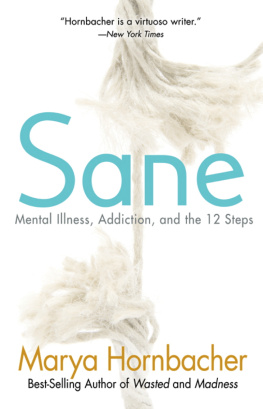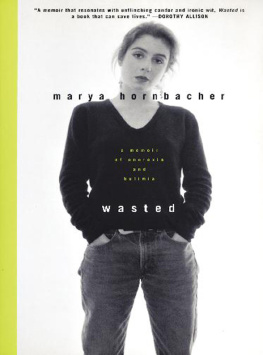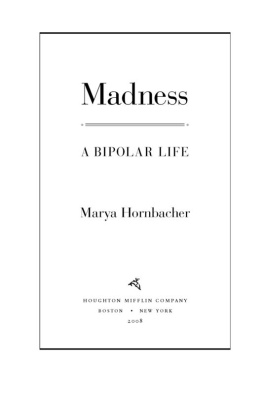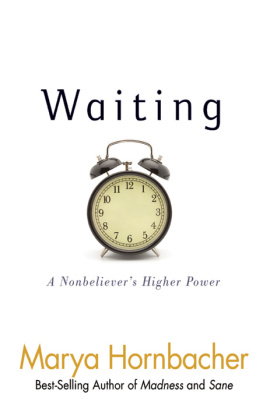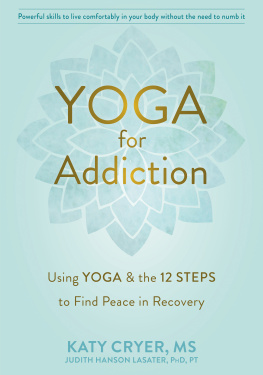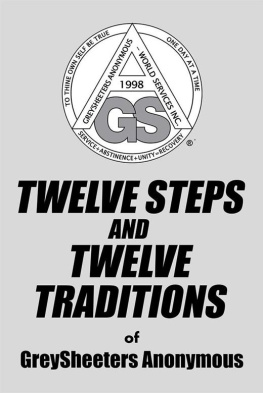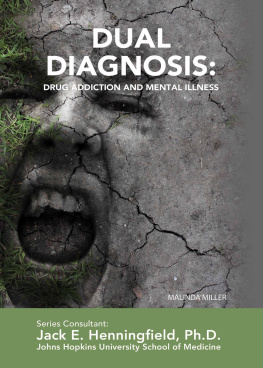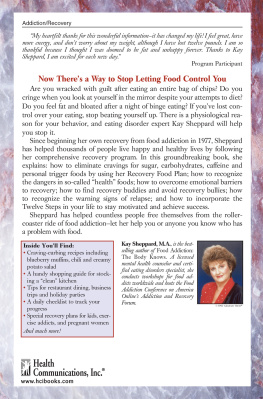Sane
Mental Illness, Addiction, and the Twelve Steps
Marya Hornbacher

Hazelden Publishing
Center City, Minnesota
800-328-9000
hazelden.org/bookstore
2010 by Marya Hornbacher
All rights reserved. Published 2010
Printed in the United States of America
Nor part of this publication may be reproduced, stored in a retrieval system, or transmitted in any form or by any meanselectronic, mechanical, photocopying, recording, scanning, or otherwisewithout the express written permission of the publisher. Failure to comply with these terms may expose you to legal action and damages for copyright infringement.
Library of Congress Cataloging-in-Publication Data
Hornbacher, Marya, 1974
Sane : mental illness, addiction, and the twelve steps / by Marya Hornbacher.
p. cm.
ISBN 978-1-59285-824-8
Ebook ISBN 978-1-59285-988-7
1. AlcoholismTreatment. 2. Mental illness. 3. Alcoholics Anonymous. 4. Twelve-step programs I. Title.
HV5278.H67 2010
616.8606dc22
2010006789
Editors note
The names, details, and circumstances have been changed to protect the privacy of those mentioned in this publication.
This publication is not intended as a substitute for the advice of health care professionals.
Alcoholics Anonymous and AA are registered trademarks of Alcoholics Anonymous World Services, Inc.
14 13 11 10 1 2 3 4 5 6
Cover design by Theresa Jaeger Gedig
Interior design by David Spohn
Typesetting by BookMobile Design and Publishing Services
Foreword
There are many poignant yet practical sayings in Twelve Step recovery. When it comes to choosing a sponsor, it is often advised to select a person who knows the way, goes the way, and can show the way. Each of these three ingredients would seem rather important in identifying a person to help with the daunting task of recovery from a co-occurring mental health and substance use problem.
Marya Hornbacher knows the way, goes the way, and shows the way. Sane is an excellent bridge to the remarkable and miraculous transformation that can take place through the fellowship and wisdom of the Twelve Step program of recovery. What Marya Hornbacher does in Sane is interpret these twelve suggested Steps for people with co-occurring disorders, making them understandable, while anticipating and addressing common concerns and questions. She translates recovery terminology that on the surface may seem at odds with having a mental health problem, and makes it accessible to anyone.
The evidence is in: peer recovery groups such as Alcoholics Anonymous and Narcotics Anonymous really work. Yet research shows that people with mental disordersparticularly severe ones such as bipolar disorder, schizophrenia, PTSD, or severe depression or anxietydont connect with AA or NA as successfully as people with more moderate emotional problems do. And even when they do connect, theyre not as successful in sustaining recovery over time.
There are probably many reasons for this. Some have to do with the nature of these mental health problems, which can be characterized by symptoms of avoidance, isolation, withdrawal, and negativity that can preempt action. Moreover, not all Twelve Step recovery groups are open to people with severe mental health issues. This is remarkable, if not paradoxical, given that groups such as AA were originally formed to offer social support and solutions to individuals who often felt ashamed and socially marginalized by their disease. The goal was to create a group that was inclusive and accepting, not exclusive and judgmental. Fortunately, most peer recovery support meetings retain the ambiance of acceptance and tolerance. The primary purpose remains, in essence, to try to get sober and help others in doing so.
Still, for the person with co-occurring disorders, the thought of going to a recovery support group meeting can be terrifying. In fact, the idea provokes anxiety for just about anyone, but in this case the prospect is so threatening that it is often avoided at all costs. So, since most alcoholics and addicts also have a mental health problem, how do any of them ever make it to a meeting, let alone stick around long enough to get clean and sober and engage in sustained recovery? We dont know. It may be a matter of miracles, willingness, desperation, social support, serendipity, timing, good luck, or simply the exhaustion of all other options.
In this book, Marya Hornbacher finds the way through or around these perceived barriers, debunking common mythologies about Twelve Step meetings. Reading Sane is akin to having an AA or NA sponsor. This book serves as the introduction, the guide, and the validation of personal experience. Sane offers ways of managing the complexity, of making it all seem okay.
Mark P. McGovern, Ph.D.
Department of Psychiatry
Dartmouth Medical School
Preface
I REMEMBER THE FIRST TIME I READ the Twelve Steps at an Alcoholics Anonymous meeting. I sat down with my cup of coffee, avoiding everyones eyes, and stared at the Steps on a poster on the wall. I made it through Step One all rightdidnt make a lot of sense to me, but I got the general ideaand then I came to Step Two: Came to believe that a Power greater than ourselves could restore us to sanity.
I tripped over the word sanity, nearly laughed out loud, and then nearly cried.
Sanity was not something I was particularly familiar with. I have a mental illness, bipolar disorder, and that in itself had taken from me time and again the sanity I desperately wanted. Compounded by years of the insanity of alcoholism and addiction, I was, at that time, pretty well convinced that sanity was something I could never hope for. I sat there as that AA meeting was called to order, slumped in my chair, and wondered if I should just walk out. I thought there was no way I could ever have what the people around me seemed to have: laughter, companionship, stabilityand sanity.
I was very wrong. The Twelve Steps have led me on a fascinating, often difficult, but eventually rewarding and powerful journey to a place of ever-increasing sanity and stability.
In this book I try to stay true to Twelve Step recovery basics while setting out some suggestions and ideas for how they can be practiced by someone who deals with mental illness. In many ways, we will work the Steps no differently than anyone elseaddiction is addiction. But the fact is, there are certain challenges the Steps appear to pose on first glance that may make them seem intimidating, or even impossible, for those of us with mental illness. They are by no means impossible, and they dont have to be intimidating. My goal is to honestly address the real challenges that people with a mental illness face as they apply the Steps in their Twelve Step support group and in all areas of their recovery.
Of course the Steps arent the only support that we need to maintain mental wellness. They didnt cure my mental illness, and they wont. Thats not their function, and in fact, we shouldnt expect them to be a miracle cure for anything. But practiced thoroughly, consistently, and in the sequence they were written, they can light the way on what is sometimes a very confusing path to recovery from addiction and to successful management of a mental health disorder. The Twelve Steps, in conjunction with all the other essential supports to mental health, are exactly what AAs Big Book says they can be: they are a program for living.
When I was still caught in active addiction and therefore unable to manage my mental illness, basic

